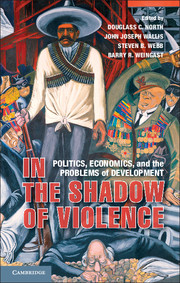Book contents
- Frontmatter
- Contents
- Contributors
- Acknowledgments
- One Limited Access Orders
- Two Bangladesh
- Three Fragile States, Elites, and Rents in the Democratic Republic of Congo (DRC)
- Four Seeking the Elusive Developmental Knife Edge
- Five Change and Continuity in a Limited Access Order
- Six India’s Vulnerable Maturity
- Seven Entrenched Insiders
- Eight From Limited Access to Open Access Order in Chile, Take Two
- Nine Transition from a Limited Access Order to an Open Access Order
- Ten Lessons
- Index
- References
One - Limited Access Orders
An Introduction to the Conceptual Framework
Published online by Cambridge University Press: 05 December 2012
- Frontmatter
- Contents
- Contributors
- Acknowledgments
- One Limited Access Orders
- Two Bangladesh
- Three Fragile States, Elites, and Rents in the Democratic Republic of Congo (DRC)
- Four Seeking the Elusive Developmental Knife Edge
- Five Change and Continuity in a Limited Access Order
- Six India’s Vulnerable Maturity
- Seven Entrenched Insiders
- Eight From Limited Access to Open Access Order in Chile, Take Two
- Nine Transition from a Limited Access Order to an Open Access Order
- Ten Lessons
- Index
- References
Summary
The Problem of Economic and Political Development
Success in economic as well as political development depends primarily on improving institutions. This has become the consensus among economists over the last twenty years, as the world has witnessed many development failures in spite of abundant capital, natural resources, and educated populations, who emigrate or stagnate if institutions do not put them to good use. The question now is: What institutions are right? As elaborated later in this chapter, some argue that developing countries should emulate the institutions of the most successful, high-income economies of the OECD. We and others, however, see evidence that most low- and middle-income countries are not ready to utilize many Western European or North American institutions or that these institutions function very differently if transplanted into these low- and middle-income economies.
The purpose of this volume is to develop and apply an alternative framework for understanding the dynamic interaction of political, economic, and social forces in developing countries, which was first laid out by North, Wallis, and Weingast (2009, hereafter NWW). The standard approach begins with neoclassical assumptions that growth will occur whenever profitable opportunities present themselves unless the intervention of political or social impediments prevent markets from working. In contrast, the alternative perspective presented here begins with the recognition that all societies must deal with the problem of violence. In most developing countries, individuals and organizations actively use or threaten to use violence to gather wealth and resources, and violence has to be restrained for development to occur. In many societies the potential for violence is latent: organizations generally refrain from violence in most years, but occasionally find violence a useful tool for pursuing their ends. These societies live in the shadow of violence, and they account for most of human history and for most of today’s world population. Social arrangements deter the use of violence by creating incentives for powerful individuals to coordinate rather than fight. The dynamics of these social arrangements differ from those described in neoclassical models, and this difference limits the value of the neoclassical tools for understanding the problems of development.
- Type
- Chapter
- Information
- In the Shadow of ViolencePolitics, Economics, and the Problems of Development, pp. 1 - 23Publisher: Cambridge University PressPrint publication year: 2012
References
- 9
- Cited by



